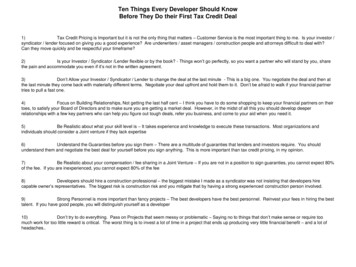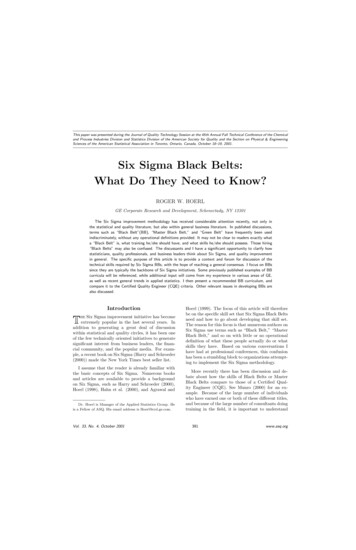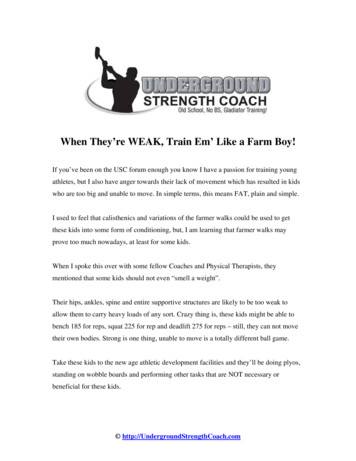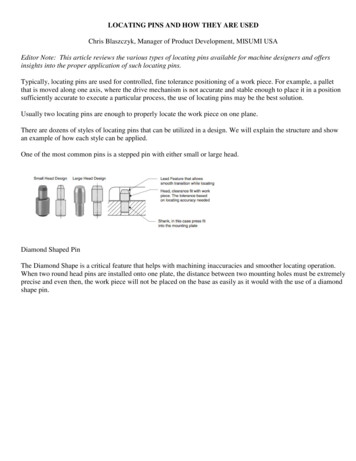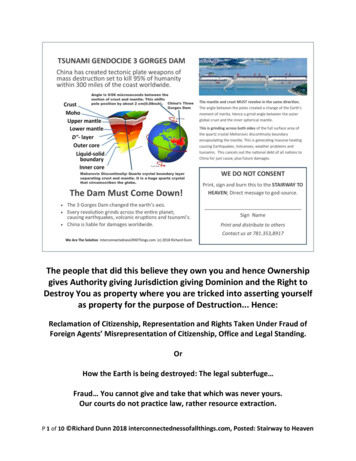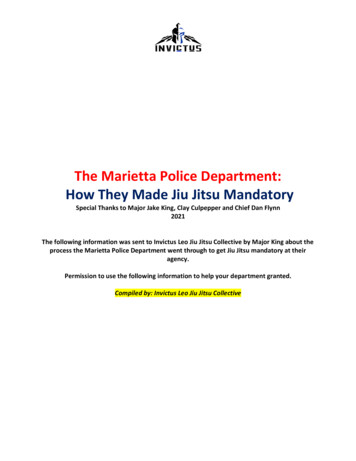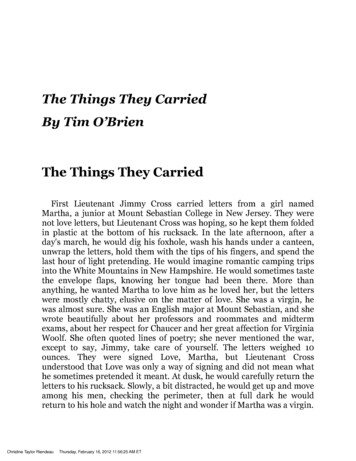
Transcription
The Things They CarriedBy Tim O’BrienThe Things They CarriedFirst Lieutenant Jimmy Cross carried letters from a girl namedMartha, a junior at Mount Sebastian College in New Jersey. They werenot love letters, but Lieutenant Cross was hoping, so he kept them foldedin plastic at the bottom of his rucksack. In the late afternoon, after aday's march, he would dig his foxhole, wash his hands under a canteen,unwrap the letters, hold them with the tips of his fingers, and spend thelast hour of light pretending. He would imagine romantic camping tripsinto the White Mountains in New Hampshire. He would sometimes tastethe envelope flaps, knowing her tongue had been there. More thananything, he wanted Martha to love him as he loved her, but the letterswere mostly chatty, elusive on the matter of love. She was a virgin, hewas almost sure. She was an English major at Mount Sebastian, and shewrote beautifully about her professors and roommates and midtermexams, about her respect for Chaucer and her great affection for VirginiaWoolf. She often quoted lines of poetry; she never mentioned the war,except to say, Jimmy, take care of yourself. The letters weighed 10ounces. They were signed Love, Martha, but Lieutenant Crossunderstood that Love was only a way of signing and did not mean whathe sometimes pretended it meant. At dusk, he would carefully return theletters to his rucksack. Slowly, a bit distracted, he would get up and moveamong his men, checking the perimeter, then at full dark he wouldreturn to his hole and watch the night and wonder if Martha was a virgin.Christine Taylor RiendeauThursday, February 16, 2012 11:56:25 AM ET
The things they carried were largely determined by necessity. Amongthe necessities or near-necessities were P-38 can openers, pocket knives,heat tabs, wristwatches, dog tags, mosquito repellent, chewing gum,candy, cigarettes, salt tablets, packets of Kool-Aid, lighters, matches,sewing kits, Military Payment Certificates, C rations, and two or threecanteens of water. Together, these items weighed between 15 and 20pounds, depending upon a man's habits or rate of metabolism. HenryDobbins, who was a big man, carried extra rations; he was especiallyfond of canned peaches in heavy syrup over pound cake. Dave Jensen,who practiced field hygiene, carried a toothbrush, dental floss, andseveral hotel-sized bars of soap he'd stolen on R&R in Sydney, Australia.Ted Lavender, who was scared, carried tranquilizers until he was shot inthe head outside the village of Than Khe in mid-April. By necessity, andbecause it was SOP, they all carried steel helmets that weighed 5 poundsincluding the liner and camouflage cover. They carried the standardfatigue jackets and trousers. Very few carried underwear. On their feetthey carried jungle boots—2.1 pounds—and Dave Jensen carried threepairs of socks and a can of Dr. Scholl's foot powder as a precautionagainst trench foot. Until he was shot, Ted Lavender carried 6 or 7ounces of premium dope, which for him was a necessity. MitchellSanders, the RTO, carried condoms. Norman Bowker carried a diary. RatKiley carried comic books. Kiowa, a devout Baptist, carried an illustratedNew Testament that had been presented to him by his father, who taughtSunday school in Oklahoma City, Oklahoma. As a hedge against badtimes, however, Kiowa also carried his grandmother's distrust of thewhite man, his grandfather's old hunting hatchet. Necessity dictated.Because the land was mined and booby-trapped, it was SOP for eachman to carry a steel-centered, nylon-covered flak jacket, which weighed6.7 pounds, but which on hot days seemed much heavier. Because youcould die so quickly, each man carried at least one large compressbandage, usually in the helmet band for easy access. Because the nightswere cold, and because the monsoons were wet, each carried a greenplastic poncho that could be used as a raincoat or groundsheet ormakeshift tent. With its quilted liner, the poncho weighed almost 2pounds, but it was worth every ounce. In April, for instance, when TedLavender was shot, they used his poncho to wrap him up, then to carryhim across the paddy, then to lift him into the chopper that took himaway.Christine Taylor RiendeauThursday, February 16, 2012 11:56:25 AM ET
They were called legs or grunts.To carry something was to hump it, as when Lieutenant Jimmy Crosshumped his love for Martha up the hills and through the swamps. In itsintransitive form, to hump meant to walk, or to march, but it impliedburdens far beyond the intransitive.Almost everyone humped photographs. In his wallet, Lieutenant Crosscarried two photographs of Martha. The first was a Kodacolor snapshotsigned Love, though he knew better. She stood against a brick wall. Hereyes were gray and neutral, her lips slightly open as she stared straighton at the camera. At night, sometimes, Lieutenant Cross wondered whohad taken the picture, because he knew she had boyfriends, because heloved her so much, and because he could see the shadow of the picturetaker spreading out against the brick wall. The second photograph hadbeen clipped from the 1968 Mount Sebastian yearbook. It was an actionshot—women's volleyball—and Martha was bent horizontal to the floor,reaching, the palms of her hands in sharp focus, the tongue taut, theexpression frank and competitive. There was no visible sweat. She worewhite gym shorts. Her legs, he thought, were almost certainly the legs ofa virgin, dry and without hair, the left knee cocked and carrying herentire weight, which was just over 100 pounds. Lieutenant Crossremembered touching that left knee. A dark theater, he remembered,and the movie was Bonnie and Clyde, and Martha wore a tweed skirt,and during the final scene, when he touched her knee, she turned andlooked at him in a sad, sober way that made him pull his hand back, buthe would always remember the feel of the tweed skirt and the kneebeneath it and the sound of the gunfire that killed Bonnie and Clyde, howembarrassing it was, how slow and oppressive. He remembered kissingher good night at the dorm door. Right then, he thought, he should'vedone something brave. He should've carried her up the stairs to her roomand tied her to the bed and touched that left knee all night long. Heshould've risked it. Whenever he looked at the photographs, he thoughtof new things he should've done.What they carried was partly a function of rank, partly of fieldspecialty.As a first lieutenant and platoon leader, Jimmy Cross carried acompass, maps, code books, binoculars, and a .45-caliber pistol thatChristine Taylor RiendeauThursday, February 16, 2012 11:56:25 AM ET
weighed 2.9 pounds fully loaded. He carried a strobe light and theresponsibility for the lives of his men.As an RTO, Mitchell Sanders carried the PRC-25 radio, a killer, 26pounds with its battery.As a medic, Rat Kiley carried a canvas satchel filled with morphine andplasma and malaria tablets and surgical tape and comic books and all thethings a medic must carry, including M&M's for especially bad wounds,for a total weight of nearly 20 pounds.As a big man, therefore a machine gunner, Henry Dobbins carried theM-60, which weighed 23 pounds unloaded, but which was almost alwaysloaded. In addition, Dobbins carried between 10 and 15 pounds ofammunition draped in belts across his chest and shoulders.As PFCs or Spec 4s, most of them were common grunts and carriedthe standard M-16 gas-operated assault rifle. The weapon weighed 7.5pounds unloaded, 8.2 pounds with its full 20-round magazine.Depending on numerous factors, such as topography and psychology, theriflemen carried anywhere from 12 to 20 magazines, usually in clothbandoliers, adding on another 8.4 pounds at minimum, 14 pounds atmaximum. When it was available, they also carried M-16 maintenancegear—rods and steel brushes and swabs and tubes of LSA oil—all ofwhich weighed about a pound. Among the grunts, some carried the M-79grenade launcher, 5.9 pounds unloaded, a reasonably light weaponexcept for the ammunition, which was heavy. A single round weighed 10ounces. The typical load was 25 rounds. But Ted Lavender, who wasscared, carried 34 rounds when he was shot and killed outside Than Khe,and he went down under an exceptional burden, more than 20 pounds ofammunition, plus the flak jacket and helmet and rations and water andtoilet paper and tranquilizers and all the rest, plus the unweighed fear.He was dead weight. There was no twitching or flopping. Kiowa, who sawit happen, said it was like watching a rock fall, or a big sandbag orsomething—just boom, then down—not like the movies where the deadguy rolls around and does fancy spins and goes ass over teakettle—notlike that, Kiowa said, the poor bastard just flat-fuck fell. Boom. Down.Nothing else. It was a bright morning in mid-April. Lieutenant Cross feltthe pain. He blamed himself. They stripped off Lavender's canteens andammo, all the heavy things, and Rat Kiley said the obvious, the guy'sdead, and Mitchell Sanders used his radio to report one U.S. KIA and torequest a chopper. Then they wrapped Lavender in his poncho. TheyChristine Taylor RiendeauThursday, February 16, 2012 11:56:25 AM ET
carried him out to a dry paddy, established security, and sat smoking thedead man's dope until the chopper came. Lieutenant Cross kept tohimself. He pictured Martha's smooth young face, thinking he loved hermore than anything, more than his men, and now Ted Lavender wasdead because he loved her so much and could not stop thinking abouther. When the dustoff arrived, they carried Lavender aboard. Afterwardthey burned Than Khe. They marched until dusk, then dug their holes,and that night Kiowa kept explaining how you had to be there, how fast itwas, how the poor guy just dropped like so much concrete. Boom-down,he said. Like cement.In addition to the three standard weapons—the M-60, M-16, and M79—they carried whatever presented itself, or whatever seemedappropriate as a means of killing or staying alive. They carried catch-ascatch-can. At various times, in various situations, they carried M-14s andCAR-15s and Swedish Ks and grease guns and captured AK-47s and ChiComs and RPGs and Simonov carbines and black market Uzis and .38caliber Smith & Wesson handguns and 66 mm LAWs and shotguns andsilencers and blackjacks and bayonets and C-4 plastic explosives. LeeStrunk carried a slingshot; a weapon of last resort, he called it. MitchellSanders carried brass knuckles. Kiowa carried his grandfather'sfeathered hatchet. Every third or fourth man carried a Claymoreantipersonnel mine—3.5 pounds with its firing device. They all carriedfragmentation grenades—14 ounces each. They all carried at least one M18 colored smoke grenade—24 ounces. Some carried CS or tear gasgrenades. Some carried white phosphorus grenades. They carried all theycould bear, and then some, including a silent awe for the terrible powerof the things they carried.In the first week of April, before Lavender died, Lieutenant JimmyCross received a good-luck charm from Martha. It was a simple pebble,an ounce at most. Smooth to the touch, it was a milky white color withflecks of orange and violet, oval-shaped, like a miniature egg. In theaccompanying letter, Martha wrote that she had found the pebble on theJersey shoreline, precisely where the land touched water at high tide,where things came together but also separated. It was this separate-buttogether quality, she wrote, that had inspired her to pick up the pebbleand to carry it in her breast pocket for several days, where it seemedChristine Taylor RiendeauThursday, February 16, 2012 11:56:25 AM ET
weightless, and then to send it through the mail, by air, as a token of hertruest feelings for him. Lieutenant Cross found this romantic. But hewondered what her truest feelings were, exactly, and what she meant byseparate-but-together. He wondered how the tides and waves had comeinto play on that afternoon along the Jersey shoreline when Martha sawthe pebble and bent down to rescue it from geology. He imagined barefeet. Martha was a poet, with the poet's sensibilities, and her feet wouldbe brown and bare, the toenails unpainted, the eyes chilly and somberlike the ocean in March, and though it was painful, he wondered who hadbeen with her that afternoon. He imagined a pair of shadows movingalong the strip of sand where things came together but also separated. Itwas phantom jealousy, he knew, but he couldn't help himself. He lovedher so much. On the march, through the hot days of early April, hecarried the pebble in his mouth, turning it with his tongue, tasting seasalt and moisture. His mind wandered. He had difficulty keeping hisattention on the war. On occasion he would yell at his men to spread outthe column, to keep their eyes open, but then he would slip away intodaydreams, just pretending, walking barefoot along the Jersey shore,with Martha, carrying nothing. He would feel himself rising. Sun andwaves and gentle winds, all love and lightness.What they carried varied by mission.When a mission took them to the mountains, they carried mosquitonetting, machetes, canvas tarps, and extra bug juice.If a mission seemed especially hazardous, or if it involved a place theyknew to be bad, they carried everything they could. In certain heavilymined AOs, where the land was dense with Toe Poppers and BouncingBetties, they took turns humping a 28-pound mine detector. With itsheadphones and big sensing plate, the equipment was a stress on thelower back and shoulders, awkward to handle, often useless because ofthe shrapnel in the earth, but they carried it anyway, partly for safety,partly for the illusion of safety.On ambush, or other night missions, they carried peculiar little oddsand ends. Kiowa always took along his New Testament and a pair ofmoccasins for silence. Dave Jensen carried night-sight vitamins high incarotene. Lee Strunk carried his slingshot; ammo, he claimed, wouldnever be a problem. Rat Kiley carried brandy and M&M's candy. Until hewas shot, Ted Lavender carried the starlight scope, which weighed 6.3Christine Taylor RiendeauThursday, February 16, 2012 11:56:25 AM ET
pounds with its aluminum carrying case. Henry Dobbins carried hisgirlfriend's pantyhose wrapped around his neck as a comforter. They allcarried ghosts. When dark came, they would move out single file acrossthe meadows and paddies to their ambush coordinates, where theywould quietly set up the Claymores and lie down and spend the nightwaiting.Other missions were more complicated and required specialequipment. In mid-April, it was their mission to search out and destroythe elaborate tunnel complexes in the Than Khe area south of Chu Lai.To blow the tunnels, they carried one-pound blocks of pentrite highexplosives, four blocks to a man, 68 pounds in all. They carried wiring,detonators, and battery-powered clackers. Dave Jensen carried earplugs.Most often, before blowing the tunnels, they were ordered by highercommand to search them, which was considered bad news, but by andlarge they just shrugged and carried out orders. Because he was a bigman, Henry Dobbins was excused from tunnel duty. The others woulddraw numbers. Before Lavender died there were 17 men in the platoon,and whoever drew the number 17 would strip off his gear and crawl inheadfirst with a flashlight and Lieutenant Cross's .45-caliber pistol. Therest of them would fan out as security. They would sit down or kneel, notfacing the hole, listening to the ground beneath them, imaginingcobwebs and ghosts, whatever was down there—the tunnel wallssqueezing in—how the flashlight seemed impossibly heavy in the handand how it was tunnel vision in the very strictest sense, compression inall ways, even time, and how you had to wiggle in—ass and elbows—aswallowed-up feeling—and how you found yourself worrying about oddthings: Will your flashlight go dead? Do rats carry rabies? If youscreamed, how far would the sound carry? Would your buddies hear it?Would they have the courage to drag you out? In some respects, thoughnot many, the waiting was worse than the tunnel itself. Imagination wasa killer.On April 16, when Lee Strunk drew the number 17, he laughed andmuttered something and went down quickly. The morning was hot andvery still. Not good, Kiowa said. He looked at the tunnel opening, thenout across a dry paddy toward the village of Than Khe. Nothing moved.No clouds or birds or people. As they waited, the men smoked and drankKool-Aid, not talking much, feeling sympathy for Lee Strunk but alsofeeling the luck of the draw. You win some, you lose some, said MitchellChristine Taylor RiendeauThursday, February 16, 2012 11:56:25 AM ET
Sanders, and sometimes you settle for a rain check. It was a tired lineand no one laughed.Henry Dobbins ate a tropical chocolate bar. Ted Lavender popped atranquilizer and went off to pee.After five minutes, Lieutenant Jimmy Cross moved to the tunnel,leaned down, and examined the darkness. Trouble, he thought—a cave-inmaybe. And then suddenly, without willing it, he was thinking aboutMartha. The stresses and fractures, the quick collapse, the two of themburied alive under all that weight. Dense, crushing love. Kneeling,watching the hole, he tried to concentrate on Lee Strunk and the war, allthe dangers, but his love was too much for him, he felt paralyzed, hewanted to sleep inside her lungs and breathe her blood and besmothered. He wanted her to be a virgin and not a virgin, all at once. Hewanted to know her. Intimate secrets: Why poetry? Why so sad? Whythat grayness in her eyes? Why so alone? Not lonely, just alone—ridingher bike across campus or sitting off by herself in the cafeteria—evendancing, she danced alone—and it was the aloneness that filled him withlove. He remembered telling her that one evening. How she nodded andlooked away. And how, later, when he kissed her, she received the kisswithout returning it, her eyes wide open, not afraid, not a virgin's eyes,just flat and uninvolved.Lieutenant Cross gazed at the tunnel. But he was not there. He wasburied with Martha under the white sand at the Jersey shore. They werepressed together, and the pebble in his mouth was her tongue. He wassmiling. Vaguely, he was aware of how quiet the day was, the sullenpaddies, yet he could not bring himself to worry about matters ofsecurity. He was beyond that. He was just a kid at war, in love. He wastwenty-four years old. He couldn't help it.A few moments later Lee Strunk crawled out of the tunnel. He cameup grinning, filthy but alive. Lieutenant Cross nodded and closed his eyeswhile the others clapped Strunk on the back and made jokes about risingfrom the dead.Worms, Rat Kiley said. Right out of the grave. Fuckin' zombie.The men laughed. They all felt great relief.Spook city, said Mitchell Sanders.Lee Strunk made a funny ghost sound, a kind of moaning, yet veryhappy, and right then, when Strunk made that high happy moaningChristine Taylor RiendeauThursday, February 16, 2012 11:56:25 AM ET
sound, when he went Ahhooooo, right then Ted Lavender was shot in thehead on his way back from peeing. He lay with his mouth open. The teethwere broken. There was a swollen black bruise under his left eye.The cheekbone was gone. Oh shit, Rat Kiley said, the guy's dead. Theguy's dead, he kept saying, which seemed profound—the guy's dead. Imean really.The things they carried were determined to some extent bysuperstition. Lieutenant Cross carried his good-luck pebble. Dave Jensencarried a rabbit's foot. Norman Bowker, otherwise a very gentle person,carried a thumb that had been presented to him as a gift by MitchellSanders. The thumb was dark brown, rubbery to the touch, and weighed4 ounces at most. It had been cut from a VC corpse, a boy of fifteen orsixteen. They'd found him at the bottom of an irrigation ditch, badlyburned, flies in his mouth and eyes. The boy wore black shorts andsandals. At the time of his death he had been carrying a pouch of rice, arifle, and three magazines of ammunition.You want my opinion, Mitchell Sanders said, there's a definite moralhere.He put his hand on the dead boy's wrist. He was quiet for a time, as ifcounting a pulse, then he patted the stomach, almost affectionately, andused Kiowa's hunting hatchet to remove the thumb.Henry Dobbins asked what the moral was.Moral?You know. Moral.Sanders wrapped the thumb in toilet paper and handed it across toNorman Bowker. There was no blood. Smiling, he kicked the boy's head,watched the flies scatter, and said, It's like with that old TV show—Paladin. Have gun, will travel.Henry Dobbins thought about it.Yeah, well, he finally said. I don't see no moral.There it Is, man.Fuck off.They carried USO stationery and pencils and pens. They carriedSterno, safety pins, trip flares, signal flares, spools of wire, razor blades,Christine Taylor RiendeauThursday, February 16, 2012 11:56:25 AM ET
chewing tobacco, liberated joss sticks and statuettes of the smilingBuddha, candles, grease pencils, The Stars and Stripes, fingernailclippers, Psy Ops leaflets, bush hats, bolos, and much more. Twice aweek, when the resupply choppers came in, they carried hot chow ingreen mermite cans and large canvas bags filled with iced beer and sodapop. They carried plastic water containers, each with a 2-gallon capacity.Mitchell Sanders carried a set of starched tiger fatigues for specialoccasions. Henry Dobbins carried Black Flag insecticide. Dave Jensencarried empty sandbags that could be filled at night for added protection.Lee Strunk carried tanning lotion. Some things they carried in common.Taking turns, they carried the big PRC-77 scrambler radio, whichweighed 30 pounds with its battery. They shared the weight of memory.They took up what others could no longer bear. Often, they carried eachother, the wounded or weak. They carried infections. They carried chesssets, basketballs, Vietnamese-English dictionaries, insignia of rank,Bronze Stars and Purple Hearts, plastic cards imprinted with the Code ofConduct. They carried diseases, among them malaria and dysentery.They carried lice and ringworm and leeches and paddy algae and variousrots and molds. They carried the land itself—Vietnam, the place, thesoil—a powdery orange-red dust that covered their boots and fatiguesand faces. They carried the sky. The whole atmosphere, they carried it,the humidity, the monsoons, the stink of fungus and decay, all of it, theycarried gravity. They moved like mules. By daylight they took sniper fire,at night they were mortared, but it was not battle, it was just the endlessmarch, village to village, without purpose, nothing won or lost. Theymarched for the sake of the march. They plodded along slowly, dumbly,leaning forward against the heat, unthinking, all blood and bone, simplegrunts, soldiering with their legs, toiling up the hills and down into thepaddies and across the rivers and up again and down, just humping, onestep and then the next and then another, but no volition, no will, becauseit was automatic, it was anatomy, and the war was entirely a matter ofposture and carriage, the hump was everything, a kind of inertia, a kindof emptiness, a dullness of desire and intellect and conscience and hopeand human sensibility. Their principles were in their feet. Theircalculations were biological. They had no sense of strategy or mission.They searched the villages without knowing what to look for, not caring,kicking over jars of rice, frisking children and old men, blowing tunnels,sometimes setting fires and sometimes not, then forming up and movingon to the next village, then other villages, where it would always be theChristine Taylor RiendeauThursday, February 16, 2012 11:56:25 AM ET
same. They carried their own lives. The pressures were enormous. In theheat of early afternoon, they would remove their helmets and flakjackets, walking bare, which was dangerous but which helped ease thestrain. They would often discard things along the route of march. Purelyfor comfort, they would throw away rations, blow their Claymores andgrenades, no matter, because by nightfall the resupply choppers wouldarrive with more of the same, then a day or two later still more, freshwatermelons and crates of ammunition and sunglasses and woolensweaters—the resources were stunning—sparklers for the Fourth of July,colored eggs for Easter—it was the great American war chest—the fruitsof science, the smokestacks, the canneries, the arsenals at Hartford, theMinnesota forests, the machine shops, the vast fields of corn and wheat—they carried like freight trains; they carried it on their backs andshoulders—and for all the ambiguities of Vietnam, all the mysteries andunknowns, there was at least the single abiding certainty that they wouldnever be at a loss for things to carry.After the chopper took Lavender away, Lieutenant Jimmy Cross ledhis men into the village of Than Khe. They burned everything. They shotchickens and dogs, they trashed the village well, they called in artilleryand watched the wreckage, then they marched for several hours throughthe hot afternoon, and then at dusk, while Kiowa explained howLavender died, Lieutenant Cross found himself trembling.He tried not to cry. With his entrenching tool, which weighed 5pounds, he began digging a hole in the earth.He felt shame. He hated himself. He had loved Martha more than hismen, and as a consequence Lavender was now dead, and this wassomething he would have to carry like a stone in his stomach for the restof the war.All he could do was dig. He used his entrenching tool like an ax,slashing, feeling both love and hate, and then later, when it was full dark,he sat at the bottom of his foxhole and wept. It went on for a long while.In part, he was grieving for Ted Lavender, but mostly it was for Martha,and for himself, because she belonged to another world, which was notquite real, and because she was a junior at Mount Sebastian College inNew Jersey, a poet and a virgin and uninvolved, and because he realizedshe did not love him and never would.Christine Taylor RiendeauThursday, February 16, 2012 11:56:25 AM ET
Like cement, Kiowa whispered in the dark. I swear to God—boom,down. Not a word.I've heard this, said Norman Bowker.A pisser, you know? Still zipping himself up. Zapped while zipping.All right, fine. That's enough.Yeah, but you had to see it, the guy just—I heard, man. Cement. So why not shut the fuck up?Kiowa shook his head sadly and glanced over at the hole whereLieutenant Jimmy Cross sat watching the night. The air was thick andwet. A warm dense fog had settled over the paddies and there was thestillness that precedes rain.After a time Kiowa sighed.One thing for sure, he said. The lieutenant's in some deep hurt. I meanthat crying jag—the way he was carrying on—it wasn't fake or anything, itwas real heavy-duty hurt. The man cares.Sure, Norman Bowker said.Say what you want, the man does care.We all got problems.Not Lavender.No, I guess not, Bowker said. Do me a favor, though.Shut up?That's a smart Indian. Shut up.Shrugging, Kiowa pulled off his boots. He wanted to say more, just tolighten up his sleep, but instead he opened his New Testament andarranged it beneath his head as a pillow. The fog made things seemhollow and unattached. He tried not to think about Ted Lavender, butthen he was thinking how fast it was, no drama, down and dead, and howit was hard to feel anything except surprise. It seemed unchristian. Hewished he could find some great sadness, or even anger, but the emotionwasn't there and he couldn't make it happen. Mostly he felt pleased to bealive. He liked the smell of the New Testament under his cheek, theleather and ink and paper and glue, whatever the chemicals were. Heliked hearing the sounds of night. Even his fatigue, it felt fine, the stiffmuscles and the prickly awareness of his own body, a floating feeling. Heenjoyed not being dead. Lying there, Kiowa admired Lieutenant JimmyCross's capacity for grief. He wanted to share the man's pain, he wantedChristine Taylor RiendeauThursday, February 16, 2012 11:56:25 AM ET
to care as Jimmy Cross cared. And yet when he closed his eyes, all hecould think was Boom-down, and all he could feel was the pleasure ofhaving his boots off and the fog curling in around him and the damp soiland the Bible smells and the plush comfort of night.After a moment Norman Bowker sat up in the dark.What the hell, he said. You want to talk, talk. Tell it to me.Forget it.No, man, go on. One thing I hate, it's a silent Indian.For the most part they carried themselves with poise, a kind of dignity.Now and then, however, there were times of panic, when they squealedor wanted to squeal but couldn't, when they twitched and made moaningsounds and covered their heads and said Dear Jesus and flopped aroundon the earth and fired their weapons blindly and cringed and sobbed andbegged for the noise to stop and went wild and made stupid promises tothemselves and to God and to their mothers and fathers, hoping not todie. In different ways, it happened to all of them. Afterward, when thefiring ended, they would blink and peek up. They would touch theirbodies, feeling shame, then quickly hiding it. They would forcethemselves to stand. As if in slow motion, frame by frame, the worldwould take on the old logic—absolute silence, then the wind, thensunlight, then voices. It was the burden of being alive. Awkwardly, themen would reassemble themselves, first in private, then in groups,becoming soldiers again. They would repair the leaks in their eyes. Theywould check for casualties, call in dustoffs, light cigarettes, try to smile,clear their throats and spit and begin cleaning their weapons. After atime someone would shake his head and say, No lie, I almost shit mypants, and someone else would laugh, which meant it was bad, yes, butthe guy had obviously not shit his pants, it wasn't that bad, and in anycase nobody would ever do such a thing and then go ahead and talkabout it. They would squint into t
for a total weight of nearly 20 pounds. As a big man, therefore a machine gunner, Henry Dobbins carried the M-60, which weighed 23 pounds unloaded, but which was almost always loaded. In addition, Dobbins carried between 10 and 15 pounds of a
